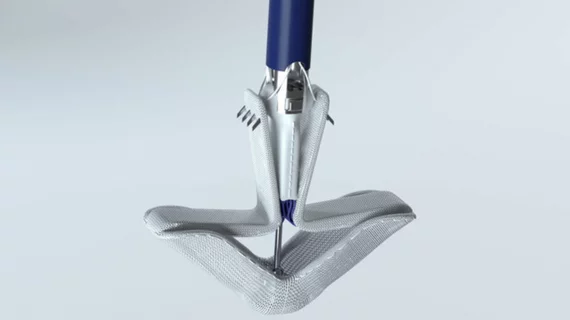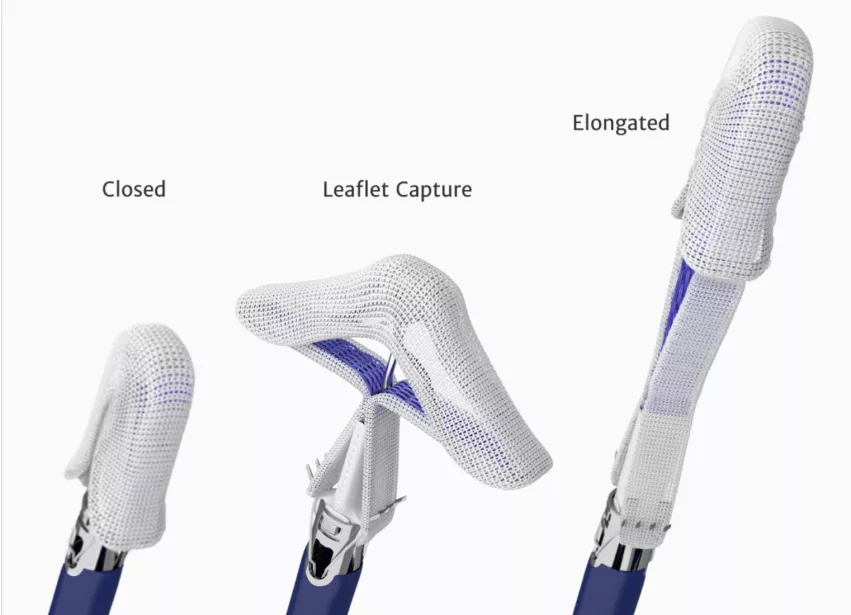FDA clears Edwards Pascal device for transcatheter mitral valve repair
The U.S. Food and Drug Administration (FDA) granted market clearance this week for the Edwards Lifesciences Corp. Pascal Precision transcatheter valve repair system for transcatheter edge-to-edge repair (TEER). It is indicated for the treatment of patients with degenerative mitral regurgitation (DMR).
Despite many companies developing transcatheter mitral valve repair and replacement (TMVR) technologies specific to the mitral valve over the past decade, this is only the second dedicated transcatheter mitral valve repair device approved in the United States. The Abbott MitraClip was the first, approved in 2013.
Similar to the the MitraClip, the Pascal Precision is a transcatheter clip system that grasps the posterior and anterior leaflets of the mitral valve leaflets to help them seal for improved coaptation to reduce or eliminate regurgitant flow. This TEER approach is similar to the open surgical repair Alfieri stitch technique.
Abbott said it is designed with with independent grasping, atraumatic clasp and closure arms, and has the ability to elongate. Engineered with an intuitive catheter and handle, the system is designed for maneuverability and stability, enabling precise navigation and implant delivery, the vendor said.
"The mitral valve is highly complex and challenging to treat," said Firas Zahr, MD, associate professor of medicine, Division of Cardiovascular Medicine, School of Medicine, Oregon Health and Science University, in a prepared statement. His patients participated in the CLASP IID clinical trial. "Through my participation in the CLASP IID pivotal trial, I have performed many cases with the Pascal system. With FDA approval of the Pascal system, U.S. clinicians now have an additional option for treating patients with severe mitral regurgitation."
Pascal CLASP IID late-breaking, head-to-head comparison trial with Mitraclip will be presented at TCT 2022
Data from the CLASP IID pivotal trial, the first randomized controlled trial to directly compare Pascal vs. MitraClip, will be presented as a late-breaking clinical science session Sept. 17 at the 2022 Transcatheter Cardiovascular Therapeutics (TCT), the annual scientific symposium of the Cardiovascular Research Foundation (CRF).
Find the complete list of TCT 2022 late-breaking presentations.
In the first report, early results of the CLASP IID trial sites with first experience with the mitral repair system showed favorable 30-day outcomes in patients with DMR≥3+ at prohibitive surgical risk.[1]
The CLAPS IID trial looked at the safety and effectiveness of the Edwards Pacsal transcatheter valve repair system in patients with degenerative mitral regurgitation who have been determined to be at prohibitive risk for mitral valve surgery by the heart team, and in patients with FMR on guideline directed medical therapy (GDMT). It is the first prospective, multicenter, randomized, controlled pivotal trial to compare the two contemporary TEER therapies. Patients will be seen for follow-up visits at discharge, 30 days, 6 months and annually through 5 years.
Edwards Lifesciences will continue collecting real-world evidence of the device with all patients receiving the Pascal in the U.S. will be enrolled in the TVT Registry for five years.
The Pascal gained European CE mark certification in 2019 for the treatment of both mitral and tricuspid regurgitation.
Pascal is also being used to treat tricuspid valves
Like the TriClip, a modified version of the MitraClip, the Pascal is also being used to treat tricuspid valve regurgitation. With poor surgical outcomes often common with the tricuspid valve, transcatheter therapies have come into the limelight the past couple years as a new way to treat these patients.
The CLASP TR trial was presented as a late-breaking study at the American College of Cardiology (ACC) 2022 meeting.
“At one year of follow-up, the repair procedure appears to be safe and significantly reduced the severity of patients’ tricuspid regurgitation and improved their ability to function in daily life, maintaining gains that we previously saw at 30 days of follow-up,” explained Adam Greenbaum, MD, co-director, Structural Heart and Valve Center, Emory University Hospital Midtown, Atlanta, in April when he presented the trial results.
Tricuspid regurgitation affects an estimated 1.6 million people in the U.S. and increases as each generation ages. The study offers further validation for TEER, Greenbaum said. Minimally invasive options are needed to treat tricuspid regurgitation, as most patients with the condition are older and may have other health problems that make them poor candidates for open-heart surgery.
The CLASP-TR study is a feasibility study of an investigational transcatheter repair system for tricuspid regurgitation. Greenbaum said they are already prepping for the CLASP II TR study, which will widen enrollment to 825 patients.
The Pascal Precision system is one of several transcatheter repair or replacement therapies in development by Edwards that are designed to address mitral and tricuspid valve disease, and the company's first therapy approved for DMR in the U.S.


